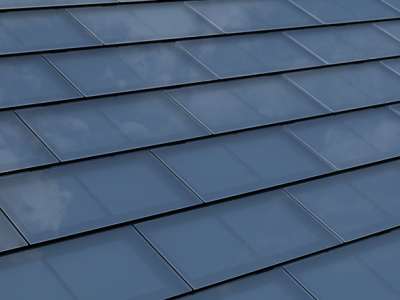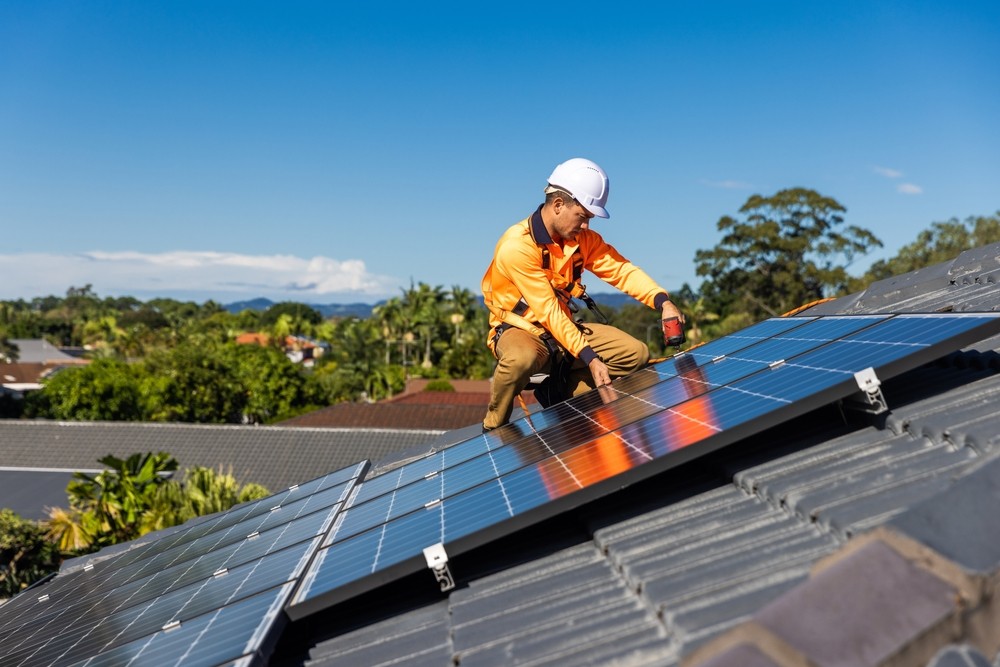Did you know? Residential solar power solutions have increased in popularity in recent years, and it’s estimated that over 1 in 7 U.S. homeowners will have solar panels on their roofs by 2030!
This comprehensive guide will explore solar roofing solutions, compare solar panels and shingles, explore frequently asked questions, address concerns like roof leaks, and much more!
Solar Roofing FAQs
What is Solar Roofing?
Solar roofing encompasses roofing materials that generate electricity from sunlight.
Materials involve solar panels mounted on existing roofs or newer technologies like solar shingles or tiles that seamlessly integrate solar cells into the roofing material.
Comparison Of Solar Panels and Solar Shingles
Solar Panels
Traditional solar panels are well-established and widely used in residential solar installations. Additionally, traditional solar panels have a proven efficiency and reliability track record.
These are typically mounted on top of existing roofs and consist of photovoltaic cells that convert sunlight into electricity.
Solar Shingles

Solar or photovoltaic shingles represent a newer, more aesthetically integrated approach to solar energy.
These shingles replace or merge with the existing roofing material, blending seamlessly with the roof’s overall design.
Solar shingles combine the functionality of roofing and solar generation.
How Much Does Solar Roofing Cost In Nashville?
The cost of solar roofing in Nashville varies based on material, installation size, and local labor and material costs.
When considering solar energy solutions for your home in Nashville, be sure to compare the costs, return on investment (ROI), and incentives associated with solar panels and solar shingles.
Let’s break down these factors to help you make an informed decision.
Solar Panels Costs
As of 2023, solar panels in the U.S. costs $3.12 per watt.
This price point makes solar panels an attractive and cost-effective choice for homeowners in Nashville.
Solar Shingle Costs
Solar shingles come at a price premium while offering a sleek and integrated appearance. In Nashville, these photovoltaic shingles typically range from $4 to $6 per watt before tax credits.
However, the aesthetic appeal and seamless integration with your roofing material might justify the higher cost for some homeowners.
How Long Does Solar Roofing Last?
In questioning the durability of solar roofing materials, you can expect a timeframe of 25-30 years.
However, the lifespan can fluctuate depending on the quality of the materials, installation, and local weather conditions.
Reputable manufacturers will also offer significant warranties, so check with your installer to be on the safe side.
Can I Get Tax Credits Or Incentives For Installing Solar Roofing?
Tennessee offers tax credits and other incentives to encourage solar energy adoption along with a federal solar tax credit.
At the state level, Tennessee currently offers two tax incentives for solar installations.
Business-owned systems can receive sales tax credits, and all types of renewable energy equipment are eligible for a partial property tax exemption.
By taking advantage of these programs, you can significantly reduce the initial installation cost, making solar energy more accessible.
Net Metering in Tennessee
Net metering allows homeowners to sell excess electricity generated by their solar panels (or shingles) back to the grid.
This arrangement not only offsets your electricity bills but can also generate additional income, further enhancing the ROI of your solar system.
Commercial or residential customers sell all or Excess energy that can be purchased through the Tennessee Valley Authority through their Dispersed Power Production Program!
Do Solar Shingles Or Tiles Work in Cloudy Weather?
While solar roofing systems are most efficient in direct sunlight, they can still generate electricity on cloudy days, although at a reduced rate.
How Do I Maintain My Solar Roof?
Solar roofing systems generally require minimal maintenance.
However, periodically checking for debris, cleaning the surface, and ensuring the system’s components function optimally will help maximize efficiency.
Some manufacturers or installers may offer maintenance services near you as well.
Can I Go Off-Grid With Solar Roofing?
While it’s possible to go off-grid with a solar roofing system, most homeowners in Nashville remain connected to the grid.
The connection allows them to draw electricity when the solar system isn’t producing enough power and potentially sell excess electricity back to the grid through net metering.
Is Solar Roofing Durable?
Quality solar roofing materials withstand typical weather conditions in Nashville, including rain, snow, and wind. Some solar tiles even rate for hail resistance.
Can I Install Solar Roofing On Any Roof?
While solar roofing installation applies to many types of roofs, certain factors, like the roof’s orientation, angle, and structural integrity, can affect the efficiency and feasibility of the installation.
Return on Investment (ROI)
The return on investment (ROI) is a critical factor to consider when evaluating solar energy solutions. It determines how long it takes to recoup your initial investment through energy savings.
Here’s how ROI compares for solar panels and solar shingles:
ROI For Solar Panels
The ROI for solar panels can vary based on local electricity costs, sunlight availability, and incentives; however, Nashville homeowners can expect an ROI of 15% over the system’s 25-30-year lifespan.
The payback period for homeowners is 10 years in 2023, making solar panels an attractive long-term investment.
ROI For Solar Shingle Systems
Solar shingles offer an appealing aesthetic advantage, but their higher upfront cost can impact ROI.
However, it’s essential to consider the overall value they bring to your home. Depending on your specific circumstances in Nashville, the ROI for solar shingles can be similar to solar panels.
The Solar Roofing Installation Process
Site Assessment in Nashville
Before installation, a thorough site assessment considers the roof’s orientation, angle, structural integrity, and potential shading issues.
Site assessments ensure optimal panel placement for maximum solar energy production.
Roof Preparation
Roof preparation involves cleaning and inspecting the roof for any damages.
Any necessary repairs to ensure the roof is in good condition before solar installation.
Installing Flashing Kits
Flashing is crucial to prevent water intrusion at mounting points. In Nashville, the installer locates the roof’s rafters, drills holes for mounting hardware, and installs special flashing kits.
These kits direct water away from the holes and onto the roof’s surface, preventing leaks.
Sealants provide an additional layer of protection against water intrusion.
Setting Up the Grid System
The grid system, consisting of vertical and horizontal rails, provides the framework for mounting solar panels securely. These rails are attached to the flashed mounting points.
Installing the Solar Panels
Solar panels are securely fastened to the horizontal rails using clamps to prevent movement due to external factors.
Panels connect in series or parallel using electrical connectors, depending on the system’s design.
Electrical Connections
After securing the panels, electrical components such as inverters, junction boxes, and conduits are installed.
Then, the system connects to the home’s electrical grid and, if applicable, to the external grid.
Final Inspection and Testing
A final inspection in Nashville ensures that everything is securely installed and correctly connected. The system undergoes testing to verify that it is producing electricity as expected.
Monitoring and Maintenance
Many modern solar installations have monitoring systems, allowing Nashville homeowners to track their solar production in real-time.
Ensure performance over time through regular maintenance, cleaning the panels, and checking system components.
Considering Solar Roofing: Advantages and Considerations
Advantages Of Solar Roofing In Nashville
Environmental Benefits
Solar roofing reduces reliance on fossil fuels, decreasing greenhouse gas emissions and contributing to a greener Nashville.
Cost Savings
Solar roofing can significantly save electricity bills over time. With rising energy costs, the savings can be substantial in the long run.
Aesthetics
Solar shingles and tiles can offer a more integrated and aesthetically pleasing look than traditional solar panels, enhancing your Nashville home’s curb appeal.
Increased Property Value
Homes with solar installations often have higher resale values, making solar roofing an investment in the long-term value of your Nashville property.
Energy Independence
Solar roofing can reduce dependence on the grid, especially when paired with energy storage solutions, ensuring a more reliable power source.
Considerations For Nashville Homeowners
Initial Cost
The upfront cost for solar roofing, especially solar shingles or tiles, can be higher than traditional solar panels.
Efficiency
Traditional solar panels might be more efficient than solar shingles or tiles, but It’s essential to compare the efficiency of different products to ensure they meet your energy needs.
Roof Suitability
Know that not all roofs are suitable for solar installations. The roof’s orientation, angle, and structural integrity can impact the efficiency and feasibility of the installation process.
Maintenance
While solar roofing systems generally require minimal maintenance, performing routine inspections, cleaning, and maintenance is essential to ensure optimal performance.
Warranty Considerations
Some roofing warranties may become void if modifications, including solar installations, are made. Check with Nashville’s roofing manufacturer or installer to ensure your security remains intact.
Roof Leaks and Solar Roofing: Ensuring a Leak-Free Installation
When installed correctly, solar panels and shingles should not cause roof leaks.
However, it’s crucial to address potential issues:
Installation Quality
The quality of the installation is the most critical factor in preventing roof leaks. Properly trained and experienced installers will use appropriate flashing, sealants, and mounting techniques to prevent water intrusion.
Roof Penetrations
Traditional solar panel installations require penetrations to secure mounting hardware. If not sealed correctly, these penetrations can be potential points for leaks.
However, modern mounting systems and techniques have minimized this risk.
Roof Age and Condition
Assess the existing roof’s condition before installing solar panels or shingles. If the roof is nearing the end of its lifespan or is in poor condition, it’s wise to repair or replace it before adding solar.
Installing solar on a compromised roof can lead to issues down the road.
Maintenance and Inspections
Regular inspections and maintenance can help identify and address potential issues before they become significant problems.
Inspections typically include checking sealants, flashing, and mounting points and ensuring debris doesn’t accumulate under or around the panels.
Warranty Considerations
Some roofing warranties might become void if modifications, including solar installations, are made.
It’s a good idea to check with the roofing manufacturer or installer before adding solar to ensure the warranty remains intact.
Final Thoughts
Solar roofing solutions offer Nashville homeowners a sustainable and cost-effective way to harness solar energy.
By understanding the costs, installation process, potential concerns, and benefits, you can embrace solar technology for your Nashville home as its popularity continues to rise.
As technology continues to advance, solar roofing will become an even more appealing option for homeowners, contributing to a greener Nashville.

